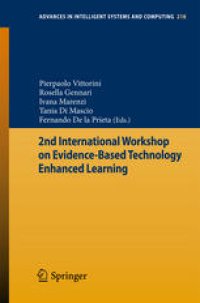
Ebook: 2nd International Workshop on Evidence-based Technology Enhanced Learning
- Tags: Computational Intelligence, Artificial Intelligence (incl. Robotics)
- Series: Advances in Intelligent Systems and Computing 218
- Year: 2013
- Publisher: Springer International Publishing
- Edition: 1
- Language: English
- pdf
Research on Technology Enhanced Learning (TEL) investigates how information and communication technologies can be designed in order to support pedagogical activities. The Evidence Based Design (EBD) of a system bases its decisions on empirical evidence and effectiveness. The evidence-based TEL workshop (ebTEL) brings together TEL and EBD.
The first edition of ebTEL collected contributions in the area of TEL from computer science, artificial intelligence, evidence-based medicine, educational psychology and pedagogy. Like the previous edition, this second edition, ebTEL’13, wants to be a forum in which TEL researchers and practitioners alike can discuss innovative evidence-based ideas, projects, and lessons related to TEL.
The workshop took place in Salamanca, Spain, on May 22nd-24th 2013.
Research on Technology Enhanced Learning (TEL) investigates how information and communication technologies can be designed in order to support pedagogical activities. The Evidence Based Design (EBD) of a system bases its decisions on empirical evidence and effectiveness. The evidence-based TEL workshop (ebTEL) brings together TEL and EBD.
The first edition of ebTEL collected contributions in the area of TEL from computer science, artificial intelligence, evidence-based medicine, educational psychology and pedagogy. Like the previous edition, this second edition, ebTEL’13, wants to be a forum in which TEL researchers and practitioners alike can discuss innovative evidence-based ideas, projects, and lessons related to TEL.
The workshop took place in Salamanca, Spain, on May 22nd-24th 2013.
Research on Technology Enhanced Learning (TEL) investigates how information and communication technologies can be designed in order to support pedagogical activities. The Evidence Based Design (EBD) of a system bases its decisions on empirical evidence and effectiveness. The evidence-based TEL workshop (ebTEL) brings together TEL and EBD.
The first edition of ebTEL collected contributions in the area of TEL from computer science, artificial intelligence, evidence-based medicine, educational psychology and pedagogy. Like the previous edition, this second edition, ebTEL’13, wants to be a forum in which TEL researchers and practitioners alike can discuss innovative evidence-based ideas, projects, and lessons related to TEL.
The workshop took place in Salamanca, Spain, on May 22nd-24th 2013.
Content:
Front Matter....Pages 1-9
The 1st Release of the TERENCE Learner GUI: The User-Based Usability Evaluation....Pages 1-8
Promoting Digital Skills and Critical Awareness through Online Search and Personal Knowledge Management: A Case Study....Pages 9-16
The TERENCE Smart Games Revision Guidelines and Software Tool....Pages 17-24
The Manual Revision of the TERENCE Italian Smart Games....Pages 25-32
Pedagogy-Driven Smart Games for Primary School Children....Pages 33-41
Technology and Elaboration of Information in Aging: Preliminary Data of Verbal vs. Visual Performance....Pages 43-48
Use of Flight Simulators in a Flight Mechanics Course: Potentials and Weaknesses....Pages 49-55
Supporting Context-Aware Collaborative Learning Activities by CAFCLA....Pages 57-65
Learning to Be an Entrepreneur: Evidence from a Technology Enhanced Learning Tool....Pages 67-74
USALSIM: Learning and Professional Practicing in a 3D Virtual World....Pages 75-82
How to Design Games for Deaf Children: Evidence-Based Guidelines....Pages 83-92
Simulation Still Rules: Modern Computer Systems Architecture Visualized and Laid Bare....Pages 93-100
How to Get a Good Job and Improve Your Career – With a PLE....Pages 101-108
Test My Code: An Automatic Assessment Service for the Extreme Apprenticeship Method....Pages 109-116
Back Matter....Pages 117-117
Research on Technology Enhanced Learning (TEL) investigates how information and communication technologies can be designed in order to support pedagogical activities. The Evidence Based Design (EBD) of a system bases its decisions on empirical evidence and effectiveness. The evidence-based TEL workshop (ebTEL) brings together TEL and EBD.
The first edition of ebTEL collected contributions in the area of TEL from computer science, artificial intelligence, evidence-based medicine, educational psychology and pedagogy. Like the previous edition, this second edition, ebTEL’13, wants to be a forum in which TEL researchers and practitioners alike can discuss innovative evidence-based ideas, projects, and lessons related to TEL.
The workshop took place in Salamanca, Spain, on May 22nd-24th 2013.
Content:
Front Matter....Pages 1-9
The 1st Release of the TERENCE Learner GUI: The User-Based Usability Evaluation....Pages 1-8
Promoting Digital Skills and Critical Awareness through Online Search and Personal Knowledge Management: A Case Study....Pages 9-16
The TERENCE Smart Games Revision Guidelines and Software Tool....Pages 17-24
The Manual Revision of the TERENCE Italian Smart Games....Pages 25-32
Pedagogy-Driven Smart Games for Primary School Children....Pages 33-41
Technology and Elaboration of Information in Aging: Preliminary Data of Verbal vs. Visual Performance....Pages 43-48
Use of Flight Simulators in a Flight Mechanics Course: Potentials and Weaknesses....Pages 49-55
Supporting Context-Aware Collaborative Learning Activities by CAFCLA....Pages 57-65
Learning to Be an Entrepreneur: Evidence from a Technology Enhanced Learning Tool....Pages 67-74
USALSIM: Learning and Professional Practicing in a 3D Virtual World....Pages 75-82
How to Design Games for Deaf Children: Evidence-Based Guidelines....Pages 83-92
Simulation Still Rules: Modern Computer Systems Architecture Visualized and Laid Bare....Pages 93-100
How to Get a Good Job and Improve Your Career – With a PLE....Pages 101-108
Test My Code: An Automatic Assessment Service for the Extreme Apprenticeship Method....Pages 109-116
Back Matter....Pages 117-117
....